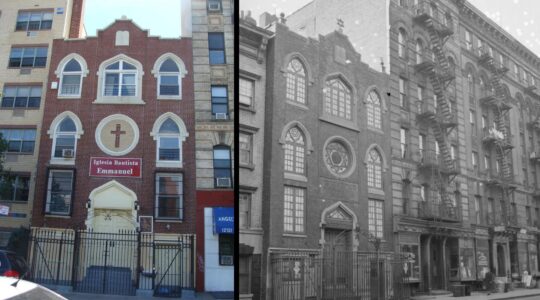Editor’s Note: This is the second article in a two-part series. The first article, “Hebrew Charters as Growth Industry” appeared last week.
Miami — Last spring, when the financially struggling Greenfield Day School announced it was closing and the National Ben Gamla Charter School Foundation moved to obtain its building, what followed could have been an episode of “Extreme Makeover: School Edition.”
Over the summer, the one-story facility on a large and well-appointed suburban campus owned by the Greater Miami Jewish Federation, was quickly transformed from Jewish day school to Hebrew charter school: mezuzahs were ripped out, walls were painted, new computers were purchased with funds from a federal startup grant, and all religious symbols were either removed or covered.
While the longtime Jewish day school underwent its extreme makeover (the majority of its students and teachers then transferred to the charter school, joined by more than 100 additional students), Miami’s Center for the Advancement of Jewish Education (CAJE-Miami), a federation agency, scrambled to create Shoresh, a Jewish after-school program that 56 Ben Gamla Kendall students now pay to attend.
“Obviously the closing of a day school was tinged with disappointment,” said Chaim Botwinick, executive and CEO of CAJE-Miami. “However, once you get over that, we saw the possibilities of reaching new families with an after-school program.”
When former Rep. Peter Deutsch (D-Fla.) founded the nation’s first Hebrew charter school in 2007, in Hollywood, Fla., most local Jewish institutions vehemently opposed it. Some feared it violated church-state separation, while others worried (correctly to some extent) that it would lure tuition-paying students from Jewish day schools.
Five years later, Deutsch’s rapidly expanding Ben Gamla network of schools — which now enrolls almost 1,400 students in four Florida locations (a fifth will open in August) — is gaining acceptance, even praise, from growing numbers of Jewish leaders in South Florida. (Ben Gamla schools have no ties to the New York-based Hebrew Charter School Center, the group behind two New York-area Hebrew charter schools and planning projects underway in Manhattan, San Diego, Los Angeles, Washington, D.C. and elsewhere.)
South Florida Jewish day schools, which emphasize that what they offer is different from Ben Gamla, say they initially lost students to charter schools, but insist that the enrollment drop has stabilized. Church-state concerns have mostly subsided, although one local Reform rabbi, in a recent column in The Florida Jewish Journal, called the schools a “threat” to the Constitution.
Meanwhile, many JCCs, synagogues and federations are eagerly capitalizing on the opportunities the Ben Gamla schools offer: the chance to fill otherwise underused facilities, bring in revenue and attract unaffiliated families.
Eight Florida Jewish institutions, like the Miami federation, now have some sort of arrangement with a Ben Gamla school, either providing optional Jewish after-school programs or leasing space or both. Others, like Temple Beth Am, a Conservative congregation in Margate, have voiced a willingness to lease space to the schools in the future.
When combined with after-school Jewish programs offered by synagogues, the schools “can save Judaism in America and revitalize the Conservative movement,” argues Rabbi Paul Plotkin, of Temple Beth Am.
Michelle Wasch Lobovits, executive director of the JCCs of the Palm Beaches, says that having the Ben Gamla Boynton school “next door” to one of her two campuses provides “an amazing opportunity to reach out to the unaffiliated.”
The JCC runs an after-school program for 65 Ben Gamla Boynton students and also leases sports facilities to the school. Temple Torah of West Boynton Beach, which leases its second floor to Ben Gamla Boynton and has 50 Ben Gamla students in its Jewish After-Care At Temple Torah (JACATT) program, has gained new members this year as a result. And its education director, Michelle Konigsburg — a former day school principal — says she’s become “enamored” of the Hebrew charter schools, which, when combined with after-school Jewish studies, are “a wonderful Jewish option.
“For those of us working in supplemental Jewish education, [it] enables us to offer Judaic content curriculum without having to focus on Hebrew language instruction during the limited amount of time we have with our students,” she said in an e-mail.
Botwinick, of Miami’s CAJE, echoed her appraisal, noting that his agency wants to use its after-school program “as a lab for experimentation” that “may have implications for Jewish after-school programs in general, not just the ones for Ben Gamla students.”
Ira Sheskin, a professor at the University of Miami who has conducted scores of Jewish population studies, including one in 2011 called “The Jewish Demography of Florida,” told The Jewish Week that the Ben Gamla schools are “from the overall point of view of the Jewish community,” a “very, very good thing.”
“Overall, we now have a lot more students learning Hebrew in Broward County [where the two oldest Ben Gamla schools are located] than we did when we just had Jewish day schools,” he said, adding, “There are a lot of American Jews for whom day school is just not affordable. This way they can learn Hebrew and get some history … When these kids grow up and they know some Hebrew, more than you’d get in Sunday school that’s for sure, it’ll be very positive for Jewish identity in the United States.”
♦
Just what effect have the Ben Gamla schools had on local Jewish day schools?
According to CAJE-Miami’s Botwinick, “the jury is still out on terms of the impact Ben Gamla schools will have on day school enrollments.”
While CAJE-Miami runs the Shoresh after-school program for students at Ben Gamla Kendall, the agency also works with 15 Jewish day schools and is cognizant of their concerns.
“Have there been kids who transferred [from Jewish day schools] to Ben Gamla?” Botwinick asked rhetorically. “Yes, but it’s not statistically significant … I do see more and more Ben Gamlas developing and emerging, but it doesn’t mean those kids would be potential market share for the day schools.”
Deutsch, whose own children attended Jewish day schools (Ben Gamla President Debra Klein also enrolls her own children in Jewish day schools), frequently insists that Ben Gamla schools largely attract Jews who would otherwise attend public schools, rather than Jewish day schools.
“This is a model where the 90-plus percent of the kids who are not in day schools can have an education that’s meaningful,” he said, adding “It would be great if all kids went to day school, but they don’t.”
Rabbi Jay Lyons, whose Jewish Upbringing Matters Program (JUMP) serves students at Ben Gamla Hollywood and Ben Gamla Plantation, echoed Deutsch, saying, “Most people we’re getting would not be going to a synagogue or a day school.”
Rabbi Danny Young, who runs the Shoresh program at Ben Gamla Kendall, also insists his students are “not by and large people coming from other supplemental schools or day schools.”
Indeed, while he initially expected that most of Shoresh’s students would, at least initially, be the Ben Gamla students who had transferred from the closed Greenfield Day School, only “about half” of the Shoresh students have day school backgrounds, and of those, not all were from Greenfield.
Rabbi Young, who was a pulpit rabbi at a Reform congregation in Pittsburgh before moving to Florida, said, “We’re seeing a number of applicants and enrollment of students who live a little further away — people who didn’t have easy access to the organized Jewish world. Or people who felt priced out of the Jewish world,” including synagogues, he said.
That said, a not-insignificant number of Ben Gamla students are transfers from Jewish day schools, while others had considered day schools before opting for Ben Gamla. For many secular families, particularly Israeli ones who’d preferred the cultural aspects of Jewish day schools over the religious ones, Ben Gamla is not only a cheaper, but a more attractive option.
Almost every parent and student this reporter approached while visiting the schools, except for one father who, like his wife, is Christian (but previously sent his daughter to a Jewish early childhood program), acknowledged having some connection to Jewish day school.
Interviewed at pick-up time outside the JUMP after-school program at Ben Gamla Hollywood, Howard Husney said his fifth-grade daughter Sarah had attended a day school before Ben Gamla, “but it got so [financially] prohibitive. A lot of the kids from there came here.”
Carol Mankes said her daughter, in kindergarten at Ben Gamla Hollywood, “probably would have gone to a Jewish school if not here.”
Asked why she opted for Ben Gamla, Mankes, who is Israeli, said, “Obviously free is nice, but the deciding factor was the JUMP program. It didn’t seem like we could go wrong.”
Another Israeli, Shlomi Rosen, said his older child — and those of many of his friends — started out in Jewish day school, before his family moved back to Israel for a few years.
“While we were in Israel, all our friends switched to Ben Gamla,” he said, explaining why, upon returning to Florida a year and a half ago, he enrolled the three children at Ben Gamla Hollywood.
“To tell you the truth, I’m very happy,” he said, noting that the principal and teachers give his children “love and attention,” helping the younger two, who didn’t speak any English when they entered, catch up to their classmates.
♦
For their part, the local day schools seem to have decided there is no point in fighting Ben Gamla and are instead insisting they serve a different market.
Tammy Fayne, secretary of the board of the David Posnack Jewish Day School, a pluralistic Jewish school in Broward County, said her school “did lose students” initially, as a result of Ben Gamla; the loss was felt sharply because it coincided with the economy collapsing.
“In the beginning, it was gray. The community didn’t know exactly what [Ben Gamla] was going to offer. Now, so many years into it, we see we’re not the same … We’re two different types of institutions with different goals, and daily life is different within the schools.”
Now, Fayne said, many Posnack students who transferred to the charter school have “come back,” and “quite frankly, our school is thriving right now.”
“Right now I don’t see us in any kind of competition,” she said, adding, “At this point our focus at Posnack is that we are a private college-prep Jewish day school providing a top-notch general academic education with a component of Judaics.”
Moshe Papo, executive director of Broward County’s Orloff Central Agency for Jewish Education, acknowledged that, while Ben Gamla sparked a lot of communal tension in its early days, “the more it establishes itself, it seems that there is a need for these schools for some segment of the Jewish population.”
And like Fayne, he thinks the Ben Gamla effect on day school enrollment has “stabilized itself.”
However, he remains skeptical about the charter schools, insisting that they “are not Jewish education” and, unlike day schools, will not produce future Jewish communal leaders.
While those like JUMP’s Rabbi Lyons and Beth Am’s Rabbi Plotkin argue the Ben Gamla schools could ultimately help boost synagogue membership, Papo thinks the opposite is happening. “A lot of people are saying, why should I send the kids to Hebrew school, when I can get it from Ben Gamla?”
In addition, he is unconvinced that the Jewish institutions partnering with Ben Gamla schools are motivated by anything more than the promise of rental income.
“The Soref JCC [which leases space to Ben Gamla Plantation] did it for only one simple reason: money,” he said.
Rabbi Bruce Warshal, whose Florida Jewish Journal column last month called the Ben Gamla schools a “threat” to the Constitution and Jewish community, voiced a similar skepticism about those Jewish institutions collaborating with the charter schools.
“These congregations are lured by the rent,” he said. “All congregations need money and $100,000 to $150,000 a year, that’s a lot of money. In the short run there are gains for the congregations, but in the long run, if this breaks down the separation of church and state, it’s disastrous for the American Jewish community and would change the character of America.”
♦
Longtime Jewish professionals now working with Ben Gamla schools acknowledge that money is a factor in Ben Gamla’s success — but not because it enriches Jewish institutions. Rather, they say, the tuition-free, taxpayer-funded schools make the cultural aspects of Jewish education accessible to a far wider swath of people, not just those who can afford a private school.
Lee Binder, the longtime head of Greenfield Day School who now, together with another administrator, runs Ben Gamla Kendall, said she sleeps better now that she no longer has to spend “90 percent” of her time raising money or watching families leave her school for economic reasons.
Free from fundraising, Binder says she is able to focus on curriculum and parental involvement — “the fun part” of running a school.
While acknowledging the “sense of loss” when the 55-student Greenfield closed, Binder said, “Once you deal with that loss, either you go toward change or run away. I believe in going toward change.”
E-mail: julie.inthemix@gmail.com
The New York Jewish Week brings you the stories behind the headlines, keeping you connected to Jewish life in New York. Help sustain the reporting you trust by donating today.




